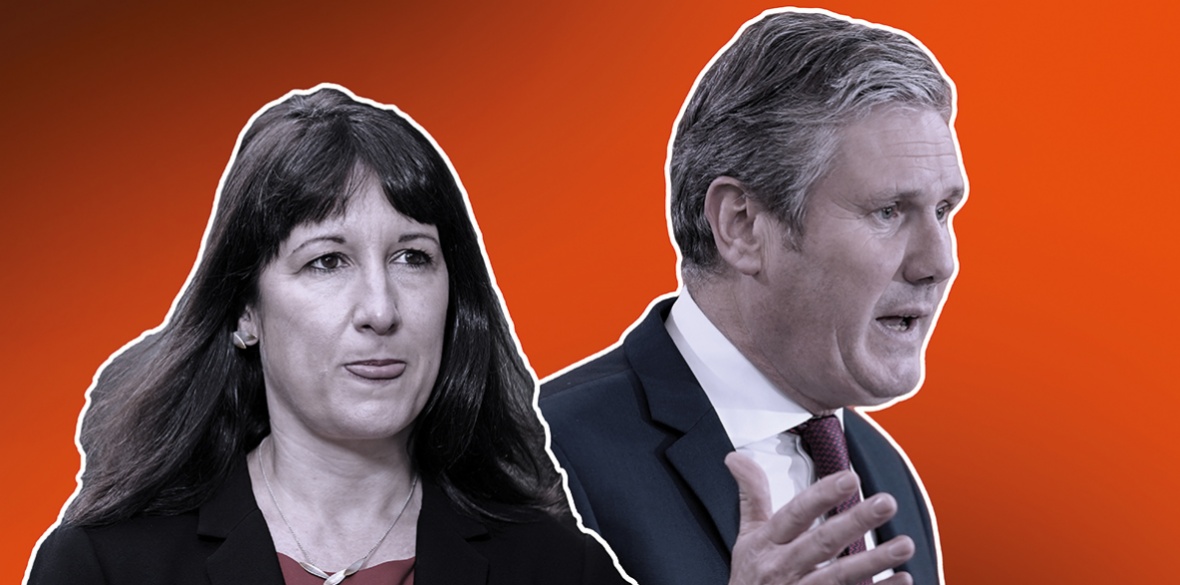This is the last article you can read this month
You can read more article this month
You can read more articles this month
Sorry your limit is up for this month
Reset on:
Please help support the Morning Star by subscribing here
KEIR STARMER suddenly announced he was abandoning nationalising energy companies on the Andrew Marr show during the Labour conference — he forced Labour to U-turn without any preparation or discussion.
This week, the Times had a long interview with Rachel Reeves where they reminded the shadow chancellor about Labour’s previous plans to nationalise rail and water. According to the Times, Reeves said, laughing, “We’re definitely not going to talk about that.” So a wider retreat from nationalisation seems to be happening — and it’s all a bit of a laugh.
Just as Labour become too timid to talk about nationalisation, fearing it will make the CBI sad, or they won’t be able to stand up to “how will you pay for it” arguments, Johnson’s Tories are busy nationalising away.
This week energy regulator OfGem put Bulb, an energy firm with 1.7m customers and a stupid name, into “special administration.” It is really a nationalisation: Bulb went bust because it promised to provide cheap energy, but rising energy prices drove it to the wall. The government doesn’t dare throw 1.7m households off their energy supply, leaving them to scrabble for much higher priced electricity and gas or see their lights go out, so the “special administration” will be run with public funds.
The energy market is full of failures like this because attempts to introduce “competition” meant lots of firms like Bulb entered the market. They don’t generate electricity, or have any cables. They are just energy traders, buying and selling gas and electricity. They got in the market with promises of low prices but were too short of cash or long-term assets to survive price rises.
Reeves is laughing at the idea of rail nationalisation, but the Tories are doing that too. In September Grant Shapps was forced to renationalise Southeastern Rail because operator Govia had failed to repay the government £25m they owed them.
Shapps said this was “serious” as the firm had “breached the trust that is absolutely fundamental” to running the railways by not declaring this big sum, and he took the franchise into public management.
There are three big problems with Labour’s retreat on public ownership. First, Labour’s sudden timid fear of nationalisation looks especially weak when the Tory government are willing to do it when they have to — this drives a big hole in the “where is the money” argument.
Secondly, Labour are missing a huge chance to say “I told you so” when the Tories are forced to nationalise — because they didn’t tell them so.
Thirdly, and here is the big issue, the argument over public ownership is that profit-driven companies are not there to help us, they are there to make profit. They are not on the Earth to be nice to us. In essential public utilities, private firms have more leverage. The government can’t let essential and monopolistic firms go bust and this “too big to fail” situation means the companies can be even more irresponsible, squeezing out cash to the point of failure.
Labour can retreat from renationalisation, but this means any future Labour or current Tory government will just end up nationalising failure and privatising success. We will bail out the bad companies and hence encourage them to be bad.
Where we bail out firms without getting ownership, we create a rod to beat our own backs. If you support private firms rather than put them into public ownership, any effective subsidy can just leach out in payments to offshore investors and other parasites.
Instead of nationalisation, Labour is proposing to cut VAT on energy bills — it’s a tax cut for consumers, but only so energy suppliers can then put up prices. Lowering tax is an effective subsidy to the energy firms, which without public ownership will just siphon off into profits and dividends.
Faced with the Bulb collapse into “special administration,” Labour had just one direct policy for the energy firms, to supplement the indirect, subsidising cut on VAT. Ed Miliband rushed out a statement, accusing the government of “complacency” and vowing “Labour will scrutinise the special administration regime to ensure it protects bill-payers and secures value for money for taxpayers.” A party whose main ambition is to “scrutinise” the government rather than push its own policy isn’t a party that wants to actually be in government.












